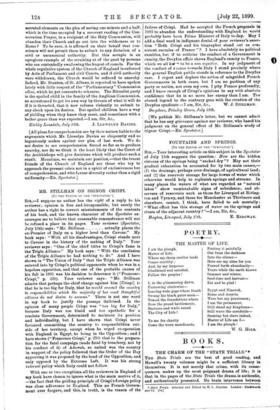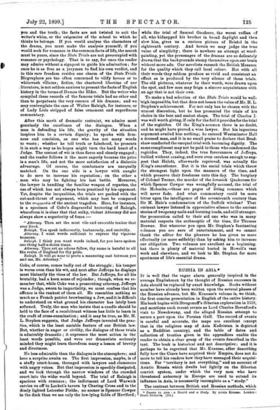BOOKS.
THE CHARM OF THE "STATE TMALS."*
THE State Trials are the best of good reading, and Howell's twenty volumes might be a sufficient library in themselves. It is not merely that crime, with its conse- quences, makes up the most poignant drama of life; it is that in the pages of the State Trials the dram& is authentic, and authentically presented. No brain intervenes between • &Lae Trtals. Selected and Edited by H. L. Stephen. London : Duckworth and Co. (5e.)
you and the truth ; the facts are not twisted to suit the writer's whim, or the exigencies of the school to which he thinks he belongs. If you would analyse the characters of the drama, you must make the analysis yourself; if you would seek for romance in the common facts of life, the search must be yours, since the State Trials are not preoccupied with romance or psychology. That is to say, for once the reader may admire without a signpost to guide his admiration ; for once he is as free as a juryman to find his own verdict, and in this rare freedom resides one charm of the State Trials.
Biographers are too often concerned to vilify heroes or to whitewash villains ; fiction, the chartered libertine of our literature, is not seldom anxious to present the facts of English history in the terms of Dumas the Elder. But the writer who compiled these records of the famous trials had no other end than to perpetuate the very essence of his dramas; and we may contemplate the case of Walter Raleigh, for instance, or of Lady Lisle stripped of false ornament and superfluous commentary.
After this merit of dramatic restraint, we admire most genuinely the excellence of the dialogue. When a man is defending his life, the gravity of the situation inspires him to a certain dignity; he speaks with firm- ness and concision, as one who has not many words to waste ; whether he tell truth or falsehood, he presents it in such a way as he hopes might turn the hard heart of a Judge. The contest of wit is thus fierce and closely engaged ; and the reader follows it the more eagerly because the prize is a man's life, and not the mere satisfaction of a dialectic advantage. Of course, the combatants are unequally matched. On the one side is a lawyer with naught to do save to increase his reputation ; on the other a
man who may be fighting his last battle. Moreover, the lawyer is handling the familiar weapon of repartee, the use of which has not always been practised by his opponent. Yet, despite the inequalities, the trials are packed with the cut-and-thrust of argument, which may best be compared to the elTlX01.6Vgia of the ancient tragedies. Here, for instance,
is a specimen of Coke's disgraceful hectoring of Raleigh, wherefrom it is clear that that sulky, violent Attorney did not always show a superiority of fence
"Attorney. Thou art the most vile and execrable traitor that ever lived.
Raleigh. You speak indiscreetly, barbarously, and uncivilly. Attorney. I want words sufficient to express thy viperous treasons.
Raleigh. I think you want words indeed, for you have spoken one thing half-a-dozen times.
Attorney. Thou art an odious fellow, thy name is hateful to all the realm of England for thy pride. Raleigh. It will go near to prove a measuring cast between you and me, Mr. Attorney."
Coke, of course, comes badly out of the struggle ; his temper is worse even than his wit, and next after Jeffreys he displays most blatantly the vices of the law. But Jeffreys, for all his brutality, had a keen sense of rejoinder ; though, when we re- member that, while Coke was a prosecuting attorney, Jeffreys was a Judge, sworn to impartiality, we mast confess that his offence is the rankest of them all. He resembles nothing so much as a French patriot browbeating a Jew, and it is difficult to understand on what ground his character has lately been softened. Truly, the man who insists that a candle should be held to the face of a recalcitrant witness has little to learn in the craft of cross-examination ; and it may be true, as Mr. H. L. Stephen suggests, that Judge Jeffreys invented the prac- tice, which is the least amiable feature of our British law. But, whether in anger or civility, the dialogue of these trials is admirably dramatic ; it expresses the most action in the least words possible, and were our dramatists seriously minded they might learn therefrom many a lesson of brevity and directness.
No less admirable than the dialogue is the atmosphere; and here a surprise awaits us. The first impression, maybe, is of a stuffy court-house, thronged with lawyers and clamorous with angry voices. But that impression is speedily dissipated, and we look through the narrow windows of the crowded court into the wider world beyond. The trial of Raleigh is spacious with romance ; the indictment of Lord Warwick carries ne off to Locket's tavern by Charing Cross and to the dimly lighted Leicester Fields; no sooner is Spencer Cowper in the dock than we see only the low-lying fields of Hertford ; while the trial of Samuel Goodeere, the worst ruffian of all, who kidnapped his brother in broad daylight and then slew him, gives us a curious picture of Bristol in the eighteenth century. And herein we may judge the true value of simplicity ; there is nowhere an attempt at word- painting, yet the personages of the dramas are so delicately drawn that the backgrounds stamp themselves upon our brain without more ado. Oar novelists ransack the British Museum for the quality which they call local colour. But with all their words they seldom produce so vivid and consistent an effect as is produced by the very silence of these trials. The old pictures, whatever be their worth, were drawn upon the spot, and few men may feign a sincere acquaintance with an age that is not their own.
To make a bad selection of the Slate Trials would be well- 'nigh impossible, but that does not lessen the value of Mr. H. L. Stephen's achievement. For not only has he chosen with the utmost discretion, but he has presented the trials of his choice in the best and easiest shape. The trial of Charles I. was well worth giving, if only for the foil it provides for the trial of the regicides. Of the King's acumen there is no doubt, and he might have proved a wise lawyer. But his ingenious argument availed him nothing; he entered Westminster Hall a doomed man, and it is no small praise to declare that Brad- shaw conducted the unequal trial with becoming dignity. The same compliment may not be paid to those who condemned the regicides. They, indeed, the true forerunners of Jeffreys, bullied without ceasing, and were even careless enough to sug- gest that Hulett, afterwards reprieved, was actually the King's executioner. But it is the social trials which throw the strongest light upon the manners of the time, and which preserve their freshness unto this day. The burglary of Colonel Turner, the murder of the lovesick Quakeress for which Spencer Cowper was wrongfully accused, the trial of the Mohocks,—these are pages of living romance which will never fade. And what commentary could be more bitter upon the intelligence of the seventeenth century than Sir M. Hale's condemnation of the Suffolk witches ? That eminent lawyer listened in appreciative silence to the ancient stories of twopenny nails and burning toads, and still stranger, the prosecution called to their aid one who was in many material respects the arcbsceptio of the time, Sir Thomas Browne. But wherever you open Mr. Stephen's fascinating volumes you are sure of entertainment, and we cannot thank the editor for the pleasure he has given us more effectually (or more selfishly) than by asking him to increase our obligation. Two volumes are excellent as a beginning, but there is plenty of material buried in Howell's vast work and elsewhere, and we look to Mr. Stephen for more specimens of life's essential drama.



































 Previous page
Previous page